Pollution spills may be overlooked amid cuts
 Getty Images
Getty ImagesSerious concerns have been raised over the ability of Wales' environmental watchdog to carry out some of its work.
A Senedd committee says years of under-investment has meant Natural Resources Wales (NRW) has been stretched until it is "too thin", meaning it now lacks the money to tackle environmental crimes - something that could leave Wales "vulnerable to environmental damage".
In its report the committee says it is "gravely concerned" at the cash-strapped body's plan to reduce the number of "low category pollution incidents" it responds to.
NRW said it has gone through a "significant period of change and challenge" and must "live within the resources available to us".
The Climate Change, Environment and Infrastructure Committee says it is worried about how NRW plans to keep an eye on matters such as fly-tipping, illegal chemical dumping and water pollution.
It says it is "gravely concerned" about proposals to focus on larger environmental incidents and adopt a "higher tolerance of risk" when managing reports of pollution.
The report concludes that "years of under investment have stretched NRW too thin and that the body is already not funded sufficiently to deal with enforcement of environmental crimes in Wales".
Committee chair, Plaid Cymru's Llyr Gruffydd, said: "Recent decisions made by NRW are deeply troubling and raise questions about the future of environmental stewardship in Wales.
"NRW's approach, a consequence of years of inadequate funding in the regulator, is gravely concerning. It leaves Wales vulnerable to environmental damage and fails to honour the values that should guide such a vital body."
"By choosing to adopt a 'higher tolerance of risk,' NRW risks turning a blind eye to pollution incidents that, while perhaps deemed less impactful, still erode the health of our ecosystems and communities," Gruffydd added.
What does NRW make of the report?
NRW said the last year has been a "significant period of change and challenge for our organisation, as we live within the resources available to us".
"Despite this, our colleagues have remained steadfast - stepping up time and time again to deliver for the people, places, and wildlife of Wales."
On cutting back on responding "low-level" incidents, NRW said: "Of the incidents we attended last year, only 5% were confirmed as having significant or major environmental impact.
"The remaining 95% were assessed as minor or causing no impact.
"This means a substantial proportion of our frontline resource is currently directed at low-impact reports, diverting capacity from higher-impact prevention and enforcement work."
In March, the visitor centres at Coed y Brenin, near Dolgellau, and Ynyslas, between Aberystwyth and Machynlleth, as well as Bwlch Nant yr Arian, near Aberystwyth, were closed by NRW to save money.
The Senedd committee said this "feels like an abandonment of public trust" and called it "unacceptable that no credible plan or timetable to reopen these centres has been provided yet".
NRW said its "focus has been firmly placed on the process to find partners, both community groups and businesses, to register an interest in providing services at the visitor centres".
As a result, it said, visitors would be able to buy drinks and cold food at Bwlch Nant yr Arian.
NRW's core grant, from the Welsh government, has not increased in recent years while costs have risen due to high inflation.
The "funding gap" in its budget is set to reach £13m in 2025-26, and will exceed £17m by 2026-27 without action.
It has sought to close more than 250 posts with redundancies and not filling vacancies.
NRW is also paying back a loan to the Welsh government which was used to settle a £19m tax bill.
The Welsh government said it will consider the findings of the report.
